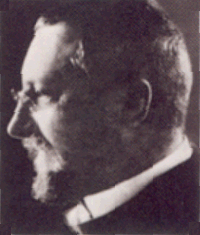Alfred Binet
1857 - 1911
Alfred Binet was both a psychologist and a lawyer. His greatest accomplishment in the field of psychology lead to what we now call the Intelligence Quotient or IQ. As a member of the French commission investigating educational concerns, developed a test to measure the 'mental age' (MA) of children entering school. Mental age refers to the child's current ability compared to other children of different ages. In other words, if a child responded to questions at about the same correctness as an eight year old, the child would be said to have a mental age of eight.
Binet's test is considered the first intelligence test, although the concept of mental age was revised twice before becoming the foundation of IQ testing. In 1914, three years after Binet's death, a German Psychologist, William Stern, proposed that by dividing the mental age of a child by his or her chronological age (CA), we could provide an easy to understand 'Intelligence Quotient.' It was again revised by Lewis Terman, from Stanford University, who expanded the test for American subjects and multiplied the Stern formula by 100. This lead to the statistical definition of Intelligence: IQ=MA/CA*100. The test was later renamed the Stanford-Binet Intelligence test as it is known as today.
